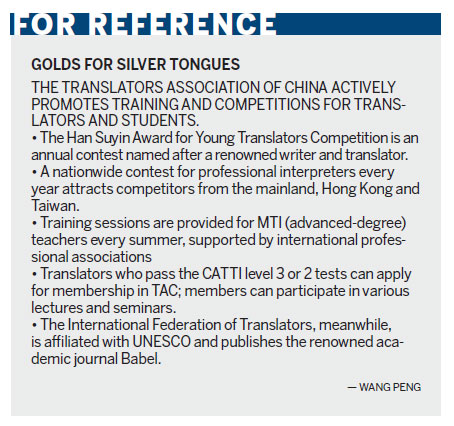Talking our way into a job
Updated: 2014-03-16 08:08
By Wang Peng(China Daily)
|
|||||||||
China's prospect-seeking English-major graduates can draw plenty of anxiety from reports.
I see other red alerts for these grads beyond the daunting employment-rate charts released in recent years by higher-education research institute MyCos.
Some choose this major for fun. Some sign up with a rather clear career path in mind. Others are just going with the flow. I was among the last group -just one of many.
Kang Zhe, a finalist at this year's CCTV contest, says: "I became a huge fan of this CCTV-Outlook English Talent Competition long ago, and those contestants were exceptional onstage! That is exactly what prompted me to further study English."
Beijing junior Chen Yu says: "I watched this press conference of premier Wen and was mesmerized by the performance of that interpreter. If you think about it, you could be the actual 'voice of China'. How cool is that!"
But dreams are dreams. If not among the shining stars, most graduates will get a more sobering picture once swamped with mailing resumes and taking interviews but not getting hired.
"Most of my classmates aren't planning careers in translation or interpretation," says Liu Chunlan, who became a New Oriental teacher in Zhejiang province's Hangzhou city.
"Some see better futures in other professions. Some just aren't qualified."
Liu's classmate says: "Actually, a lot of the translation companies are hiring, but they're squeezers. You can't even feed yourself with that salary."
I asked the head of one of the language-service firms based in Beijing about that.
"With globalization and localization, this market will be big soon," says Tian Huicai, manager of YXtrans.
"But the schools aren't cultivating eligible candidates. They lack practical experience in CAT (computer-assisted translation) and professional knowledge. That's why we wouldn't offer good salaries.
"Good conference interpreters are also in huge demand, and that pays pretty well. But that takes a lot more discipline and competency - something the fresh graduates can't offer."
There are minor distinctions among English majors. Some focus on culture and literature, some on translation and interpretation and others produce students with various second degrees. But somehow these varieties still can't fit clients' needs.
The rise of master's degrees in translation and interpretation programs and CAT courses, and the development of tests like the CATTI might reflect the silver lining. These are parts of an overall plan by authorities to meld translators' abilities with market needs.
"I believe it will get better, as long as regulations and standardized tests are in place and students are learning to catch up," Tian says.
It has been an arduous year for me. I interviewed with some major State-owned Enterprises but, even with my CATTI, was rejected.
They said I have to get experience before getting any job.
So for now - whatever career path I take - ultimately, I'll be focusing on building my core competency.
I'd compare a successful translator to a USB - plugged in, it works immediately and communicates easily with every device.
Contact the writer at [email protected].
For China Daily

(China Daily 03/16/2014 page3)